 Petzlover
Petzlover Both American Wirehair and Sokoke are originated from United States. Both American Wirehair and Sokoke are having almost same weight. Both American Wirehair and Sokoke has same life span. Both American Wirehair and Sokoke has same litter size. Both American Wirehair and Sokoke requires Low Maintenance.
Both American Wirehair and Sokoke are originated from United States. Both American Wirehair and Sokoke are having almost same weight. Both American Wirehair and Sokoke has same life span. Both American Wirehair and Sokoke has same litter size. Both American Wirehair and Sokoke requires Low Maintenance.
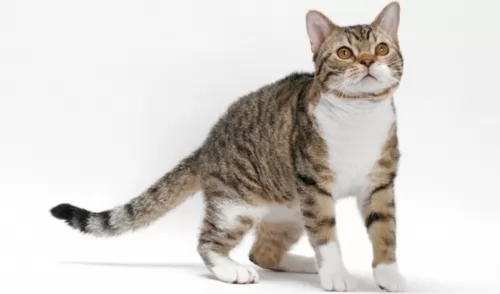 The American Wirehair started as a spontaneous mutation so that somewhere along the line, an unusual litter with this unique wiry type of fur was born.
The American Wirehair started as a spontaneous mutation so that somewhere along the line, an unusual litter with this unique wiry type of fur was born.
The cat hails from New York and it was in 1966 that a couple of barn cats had a litter of kittens, some of which were born with this peculiar wiry hair. Only one kitten survived – a male – and later it was discovered that the gene responsible for the wirehair coat was dominant so that only one parent required the gene to produce Wirehair offspring.
Today, all American Wirehairs are descendants of this one surviving male kitten. Today the breed is still fairly rare. It is, however, recognized by the four largest North American cat associations.
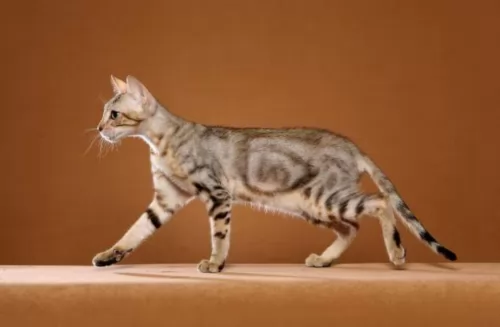 Compared to other breeds of cat, the rare Sokoke Forest Cat is a fairly new natural breed. It comes from the Sokoke district of eastern Kenya but was developed in the USA.
Compared to other breeds of cat, the rare Sokoke Forest Cat is a fairly new natural breed. It comes from the Sokoke district of eastern Kenya but was developed in the USA.
It is in fact, named after the Arabuko Sokoke National Forest, from where the wild foundation stock came from. Wildlife artist Jeni Slater started breeding these cats in the 1970s. They eventually reached Denmark, where further breeding continued, with the cat becoming popular with local cat fanciers, and laid the foundation of the breed in Europe.
Today, there are just a few breeders registered in the UK and TICA, The International Cat Association lists the Sokoke cat as a New Preliminary Race and it was recognized by FIFe in 1993.
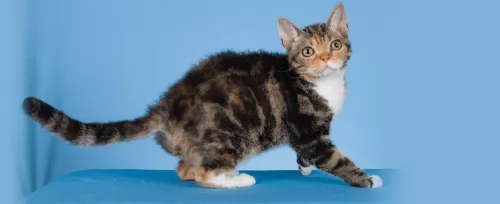 The American Wirehair is a medium-sized cat, strong and powerful, and can weight 5, 6 or 7 kg.
The American Wirehair is a medium-sized cat, strong and powerful, and can weight 5, 6 or 7 kg.
The head is in proportion to the body and the cat has a strong muzzle and chin. The ears are medium-sized and are rounded at the tips while the eyes are large, round, and set well apart.
It’s the coat that draws attention as unlike a regular cat’s silky fur, the fur of this cat is springy, coarse and wiry to the touch. The coat can be any color or pattern. It is the cat’s very coat that distinguishes it from all other breeds.
With this coat, the less grooming the better. Brushing or combing can damage it, so unless he is shedding heavily, leave it alone.
The only other care he needs really is nail trimming, to check inside his mouth for bad teeth and to also check inside his ears for redness. Both the teeth and the ears can be a source of pain for your pet.
The American Wirehair may have a harsh coat but there is nothing harsh about his personality at all. He is amicable and loving, getting on well with all members of his human family.
He is an independent cat and while he loves spending time with his family, he is quite capable of spending time on his own as well.
The American Wirehair is a playful cat so you want to give him some toys to entertain himself for when you’re not around.
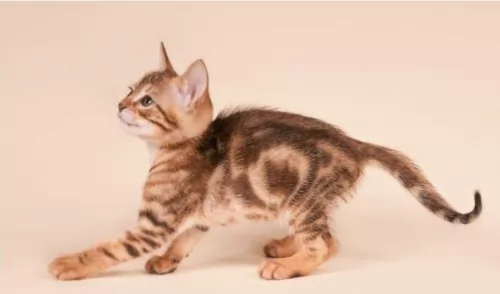 The Sokoke is a medium-sized cat with a long, lean body and slender legs. The hind legs are somewhat longer than the front legs. The head is smallish and round and he has a constantly alert look to him.
The Sokoke is a medium-sized cat with a long, lean body and slender legs. The hind legs are somewhat longer than the front legs. The head is smallish and round and he has a constantly alert look to him.
A striking characteristic of the Sokoke cat is its tabby fur, which people say looks like the bark of a tree and it is brindle in coloring.
The tail is medium to long and the ears are also fairly large, The eyes are large and almond-shaped and can be greenish to brown. The coat is short and coarse.
Cat lovers enjoy these playful, curious, intelligent, and family-orientated cats. In spite of their wild side, they adapt easily into different homes.
They’re inquisitive and will follow you, much like a dog. They will even enjoy a leash being put on them and being taken for a walk. They’re very sociable and vocal too and get on with everyone, children and other pets included.
They’re playful cats, loving to jump and climb and then look down at you from their high perches. Easily bored, you will need to provide fun and games continuously.
They enjoy being involved with everything you’re doing and form a strong bond with their owners. Because the Sokoke is social and affectionate, they require quite a lot of attention, and if they don’t get the attention they crave, they meow in anxiety.
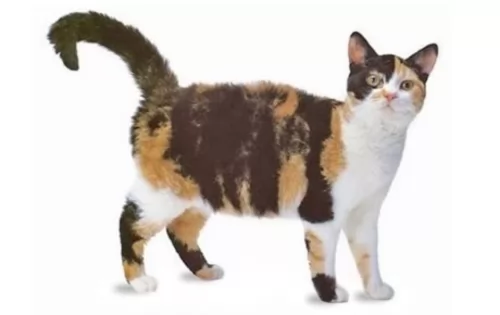 The American Wirehair makes a splendid pet, and while he isn’t the best breed for children, he can make a good pet with those children who have been taught kindness, gentleness and respect for animals.
The American Wirehair makes a splendid pet, and while he isn’t the best breed for children, he can make a good pet with those children who have been taught kindness, gentleness and respect for animals.
He is calm, quiet, dependent, and sociable and by providing him with a good home, he’ll prove to be a wonderful pet and companion.
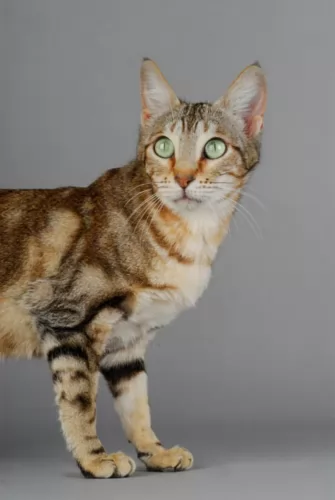 Your Sokoke is a very social cat and he will get on particularly well in a home with children who have been taught to be kind and gentle with animals.
Your Sokoke is a very social cat and he will get on particularly well in a home with children who have been taught to be kind and gentle with animals.
They are able to adapt well to homes where there are other pets too. They just love exercise and lots of fun. They don’t like being in a home where the owner is out at work all day. The solution to this is to provide him with another cat as a companion.
Sokoke cats are great with people of all ages, and when you bring one of these lively cats into your home, make sure he also receives his share of love and companionship.
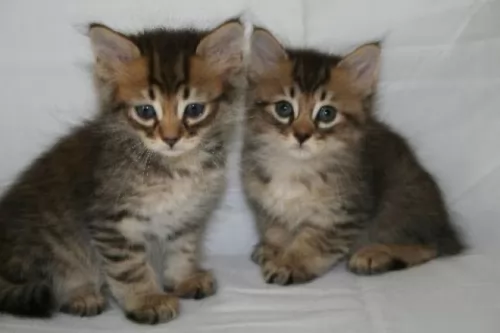 The American Wirehair is a healthy type of cat but any cat can develop health issues.
The American Wirehair is a healthy type of cat but any cat can develop health issues.
Be aware of Hypertrophic cardiomyopathy – a common form of heart disease in cats where there is the thickening of the heart muscle.
Be careful of overfeeding your cat as obesity is a major contributory disease to many illnesses that a cat gets. Excess weight can contribute to diabetes and arthritis and put pressure on your cat’s joints. Certainly, carrying extra weight can shorten your cat’s life. Make sure your cat gets smaller, healthier meals and that he is active and exercised.
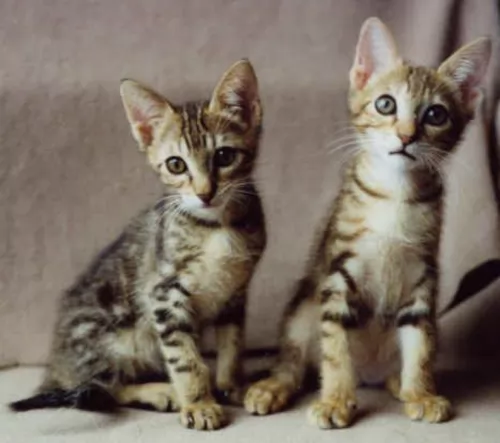 Sokoke cats are generally healthy and have no inherited diseases. To ensure that your Sokoke stands a chance of having a healthy life, you need to have him vaccinated against the life-threatening cat diseases there are.
Sokoke cats are generally healthy and have no inherited diseases. To ensure that your Sokoke stands a chance of having a healthy life, you need to have him vaccinated against the life-threatening cat diseases there are.
If your Sokoe cat isn’t his usual self day after day, make a point of getting him to the vet just as soon as possible.
Parasites are a terrible scourge with cats, and in fact, the number one cause of hair loss in cats is fleas. The bite of a flea can cause an allergic reaction. Your cat can become miserable with continuous biting, itching, and scratching and this can all lead to hair loss.
It is a wise move to speak to your vet about a good product to treat your furry friend with.
There can actually be many causes of diarrhea in cats and one of them is parasites, but it can also be caused by a viral infection or food allergy or something else.
You want to get your cat to the vet who can help you bring it under control. You may also have to feed your cat a bland kind of diet to help the cat’s digestive tract recover from the diarrhea.
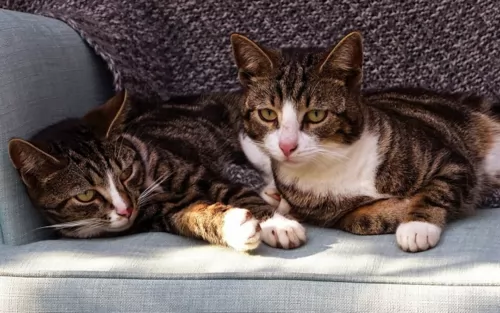 Brush the cat gently once a week. Your cat will love the connection you and he has. While you brush him, make a point of checking inside his ears and inside his mouth as well. It is also time to trim his nails. If you are hesitant to do this, ask you vet for suggestions or you can make use of a pet groomer too.
Brush the cat gently once a week. Your cat will love the connection you and he has. While you brush him, make a point of checking inside his ears and inside his mouth as well. It is also time to trim his nails. If you are hesitant to do this, ask you vet for suggestions or you can make use of a pet groomer too.
Make sure your pet cat is free from parasites such as fleas, ticks and heartworm. Your vet can recommend a treatment and it is also a good idea to talk to your vet about vaccines for your cat.
Have your American Wirehair spayed or neutered to prevent unwanted kittens and to promote better health for your cat.
Always choose healthy food for your pet, bearing in mind that cats are carnivores, which means that you need to choose cat-food for your pet that has fish and meat in it. It can be difficult making good homemade food for your cat but there are excellent commercially prepared cat foods to ensure your cat gets the correct balance of nutrients and calories. Bear in mind that your cat's nutritional requirements change through their different stages of life.
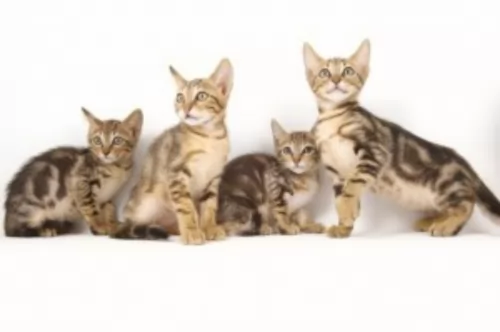 Because the Sokoke’s coat is short and close-lying, with little or no undercoat, brushing once a week will be sufficient.
Because the Sokoke’s coat is short and close-lying, with little or no undercoat, brushing once a week will be sufficient.
The Sokoke cat is very energetic, and he will need games, toys, and attention to keep him physically and mentally stimulated. They love climbing so a climbing tree and other kind of equipment will be a good idea.
Provide your cat with a litter box and ensure it is kept scrupulously clean by removing the cat’s feces every single day.
Diet is of critical importance to the health and happiness of a cat. Some people try to feed their cats human foods and wonder why their cat is continuously sick. A cat is a carnivore and he requires meat.
You can speak to your vet about the best kind of commercial cat food there is for your cat. Read the label and feed him portion-sizes as directed.